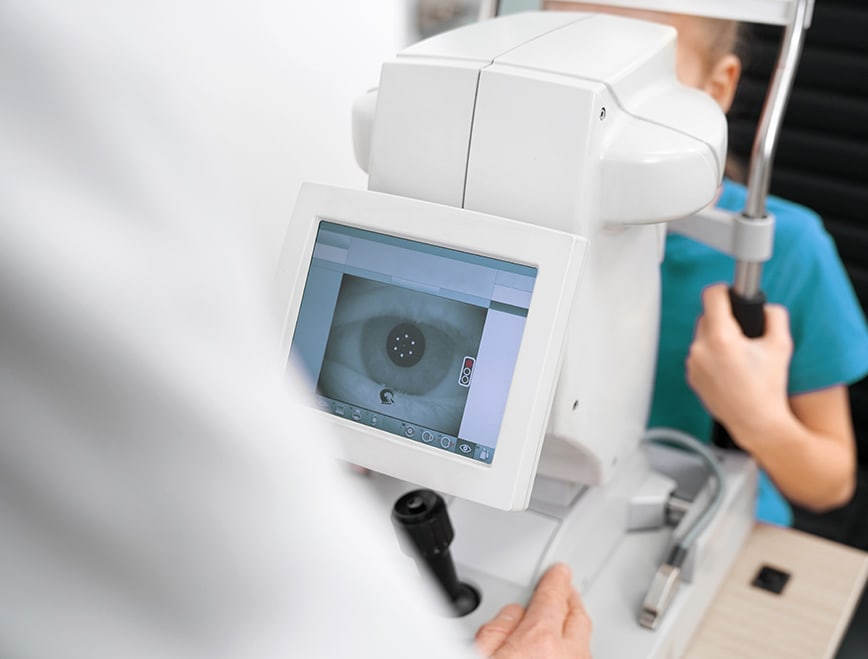Diabetic Eye Exams Can Preserve Eye Health
Diabetes can impact your vision and lead to eye diseases like diabetic retinopathy and glaucoma, which can cause vision loss if not treated. But eye exams can help us catch these issues early and protect your vision.
We use updated technology like OCT, retinal imaging, and fluorescein angiography to get a detailed look at your eye health. These tools allow us to detect potential problems early before they cause damage.
A diabetic eye exam is your eyes’ best defense. Contact our friendly team to book your appointment.
Request AppointmentHow Diabetes Affects the Eyes
Uncontrolled diabetes elevates blood sugar levels, which can damage the delicate blood vessels in the light-sensitive area of your eye called the retina.
This damage weakens the vessels, causing them to leak fluid or grow abnormally. Both scenarios can blur your vision and, if left untreated, lead to serious eye diseases like diabetic retinopathy and glaucoma.
Our Diagnostic Technology
We put a lot of effort and focus into early detection and accurate monitoring of diabetic eye disease. We use OCT, retinal imaging, and fluorescein angiography to evaluate your retinal health and monitor even the smallest changes in your eye. These tools play a crucial role in identifying changes in the eye before they progress, allowing for quicker intervention.
OCT Retinal Imaging
Optical coherence tomography (OCT) is a non-invasive retinal imaging tool that uses lightwaves to take high-definition, cross-sectional images of the retina, allowing for a detailed view of its many layers.
For patients with diabetes, OCT technology is particularly valuable for identifying subtle changes in the retina, such as swelling, fluid accumulation, or abnormalities in the blood vessels, which may point to glaucoma or diabetic retinopathy.
Retinal Imaging with Fluorescein Angiography
Retinal imaging takes highly detailed color photos of the inner back surface of your eye, including the retina, optic nerve, and macula. It’s a useful tool for diagnosing and managing diabetic retinopathy, macular edema, and glaucoma.
Retinal imaging can be done with fluorescein angiography for a more detailed look at the retina’s blood vessels and structures. This test uses a fluorescein dye injected into the bloodstream to illuminate the retinal vessels, creating high-contrast images.
Fluorescein angiography is particularly crucial for helping us detect diabetic retinopathy, macular edema, and macular degeneration.
Diabetic Eye Diseases & Conditions
Diabetes increases your risk of several eye conditions, particularly those affecting the retina. Diabetic retinopathy and macular edema are the biggest complications that can lead to vision loss. Glaucoma and cataracts are also more common in people with diabetes.
Early detection and management are key, as these eye diseases can progress without noticeable symptoms. Regular eye exams are essential for those with diabetes to monitor eye health and prevent the progression of these sight-threatening conditions.
Diabetic Retinopathy
Diabetic retinopathy occurs when high blood sugar levels damage the blood vessels in the retina. As these blood vessels become damaged, they can leak fluid or bleed, causing swelling and scarring on the retina.
There are 2 types of diabetic retinopathy: non-proliferative and proliferative.
- Non-proliferative retinopathy is an early stage where small blood vessels in the retina are damaged and may leak fluid into the macula, leading to macular edema. You may not notice symptoms during this stage.
- Proliferative retinopathy is a more advanced stage where new, abnormal blood vessels grow on the surface of the retina.
Treatments can include injections, laser therapy, and surgery for advanced cases. Managing diabetes through diet, exercise, and medication can help prevent and manage diabetic retinopathy.
Diabetic Macular Edema
Diabetic macular edema is a complication of diabetic retinopathy and affects the macula, the part of the retina responsible for sharp central vision. Edema occurs when blood vessels in the retina leak fluid, causing the macula to swell and leading to blurry vision.
Regular diabetic eye exams, managing diabetes, and various treatments can help reduce swelling and prevent vision loss.
Glaucoma
Those with diabetes are twice as likely to get glaucoma than those without. Glaucoma is a group of eye conditions that damage the optic nerve, which can lead to vision loss and blindness if left untreated.
Regular eye exams can help catch early signs of glaucoma, where treatments are more effective at preventing or slowing vision loss.
Cataracts
Cataracts develop as a natural part of aging. As we get older, changes in the eye’s lens can lead to cataracts, but high blood sugar levels also cause changes that can make cataracts form earlier and faster in people with diabetes.
Your Eye Care Is in Good Hands
We’re focused on protecting and preserving your eye health and vision for years. Our team offers comprehensive diabetic eye exams using diagnostic technology to closely monitor your eye health and implement personalized treatment plans built just for you. Call us today to book an appointment.
Request AppointmentOur Location

Our Address
- 228 Barks Rd. E
- Marion, OH 43302
Contact Information
- Phone: 740-389-2306
- Fax: 740-386-2859
- Email: [email protected]
Our Hours
- Monday: 8:30 AM – 5:00 PM
- Tuesday: 8:30 AM – 7:00 PM
- Wednesday: 8:30 AM – 5:00 PM
- Thursday: 8:30 AM – 5:00 PM
- Friday: 8:30 AM – 1:00 PM
- Saturday: Closed
- Sunday: Closed

Our Brands












